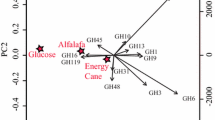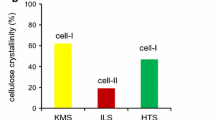Abstract
Lignocellulosic biomass represents an abundant, renewable resource that can be used to produce biofuels, low-cost livestock feed, and high-value chemicals. The potential of this resource has led to intensive research efforts to develop cost effective methods to breakdown lignocellulose. The efficiency with which the anaerobic fungi (phylum Neocallimastigomycota) degrade plant biomass is well recognized and in recent years has received renewed interest. Transcriptomics has been used to identify enzymes that are expressed by these fungi and are involved in the degradation of a range of lignocellulose feedstocks. The transcriptome is the entire complement of coding and noncoding RNA transcripts that are expressed by a cell under a particular set of conditions. Monitoring changes in gene expression can provide fundamental information about the biology of an organism. Here we outline a general methodology that will enable researchers to conduct comparative transcriptomic studies with the goal of identifying enzymes involved in the degradation of the plant cell wall. The method described here includes growth of fungal cultures, isolation and sequencing of RNA, and a basic description of data analysis for bioinformatic identification of differentially expressed transcripts.
Access this chapter
Tax calculation will be finalised at checkout
Purchases are for personal use only
Similar content being viewed by others
References
Tsang A, Butler G, Powlowski J, Panisko EA, Baker SE (2009) Analytical and computational approaches to define the Aspergillus niger secretome. Fungal Genet Biol 46:S153–S160
Kolbusz MA, Di Falco M, Ishmael N, Marqueteau S, Moisan MC, da Silva BC, Powlowski J, Tsang A (2014) Transcriptome and exoproteome analysis of utilization of plant-derived biomass by Myceliophthora thermophila. Fungal Genet Biol 72:10–20
Gruninger RJ, Puniya AK, Callaghan TM, Edwards JE, Youssef N, Dagar SS, Fliegerova K, Griffith GW, Forster R, Tsang A, McAllister T, Elshahed MS (2014) Anaerobic fungi (phylum Neocallimastigomycota): advances in understanding their taxonomy, life cycle, ecology, role and biotechnological potential. FEMS Microbiol Ecol 90(1):1–17
Couger MB, Youssef NH, Struchtemeyer CG, Liggenstoffer AS, Elshahed MS (2015) Transcriptomic analysis of lignocellulosic biomass degradation by the anaerobic fungal isolate Orpinomyces sp. strain C1A. Biotechnol Biofuels 8:208
Solomon KV, Haitjema CH, Henske JK, Gilmore SP, Borges-Rivera D, Lipzen A, Brewer HM, Purvine SO, Wright AT, Theodorou MK, Grigoriev IV, Regev A, Thompson DA, O’Malley MA (2016) Early-branching gut fungi possess a large, comprehensive array of biomass-degrading enzymes. Science 351(6278):1192–1195
Pollegioni L, Tonin F, Rosini E (2015) Lignin-degrading enzymes. FEBS J 282(7):1190–1213
Song L, Florea L (2015) Rcorrector: efficient and accurate error correction for Illumina RNA-seq reads. GigaScience 4:48
Jiang H, Lei R, Ding SW, Zhu S (2014) Skewer: a fast and accurate adapter trimer for next-generation sequencing paired-end reads. BMC Bioinformatics 15:182
Kopylova E, Noe L, Touzet H (2012) SortMeRNA: fast and accurate filtering of ribosomal RNAs in metatranscriptomic data. Bioinformatics 28:3211–3217
Crusoe MR, Alameldin HF, Awad S et al (2015) The khmer software package: enabling efficient nucleotide sequence analysis. F1000 Research 4:900
Li D, Liu CM, Luo R, Sadakane K, Lam TW (2015) MEGAHIT: an ultra-fast single-node solution for large and complex metagenomics assembly via succinct de Bruijn graph. Bioinformatics 31:1674–1676
Smith-Unna RD, Boursnell C, Patro R, Hibberd JM, Kelly S (2015) TransRate: reference free quality assessment of de-novo transcriptome assemblies bioRxiv 021626
Simao FA, Waterhouse RM, Ioannidis P, Kriventseva EV, Zdobnov EM (2015) BUSCO: assessing genome assembly and annotation completeness with single-copy orthologs. Bioinformatics 31:3210–3212
Love MI, Huber W, Anders S (2014) Moderated estimation of fold change and dispersion for RNA-seq data with DESeq2. Genome Biol 15:550
Wolfe R (2011) Techniques for cultivating methanogens. Methods Enzymol 494:1–22
Encode consortium. https://genome.ucsc.edu/ENCODE/protocols/dataStandards/ENCODE_RNAseq_Standards_V1.0.pdf
Author information
Authors and Affiliations
Corresponding author
Editor information
Editors and Affiliations
Rights and permissions
Copyright information
© 2017 Springer Science+Business Media LLC
About this protocol
Cite this protocol
Gruninger, R.J., Reid, I., Forster, R.J., Tsang, A., McAllister, T.A. (2017). Identification of Genes Involved in the Degradation of Lignocellulose Using Comparative Transcriptomics. In: Abbott, D., Lammerts van Bueren, A. (eds) Protein-Carbohydrate Interactions. Methods in Molecular Biology, vol 1588. Humana Press, New York, NY. https://doi.org/10.1007/978-1-4939-6899-2_21
Download citation
DOI: https://doi.org/10.1007/978-1-4939-6899-2_21
Published:
Publisher Name: Humana Press, New York, NY
Print ISBN: 978-1-4939-6898-5
Online ISBN: 978-1-4939-6899-2
eBook Packages: Springer Protocols




